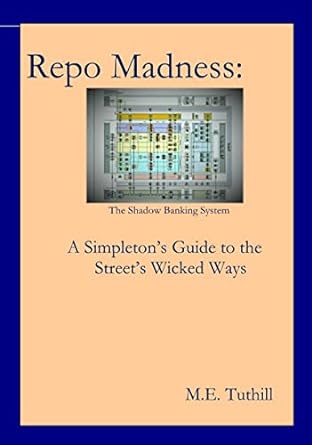Meet M.E. Tuthill, an insightful financial professional turned author whose extensive career has positioned her as a vigilant observer of the economic landscape. With years of experience in the financial realm, Tuthill wields her expertise to shed light on the shadows of the financial world. Her latest literary endeavor, Repo Madness: A Simpleton’s Guide to the Street’s Wicked Ways, thrusts readers into a gripping narrative that deciphers the enigmatic evolution of shadow banking—a system that has burgeoned into a behemoth, doing nothing good for our society or economy. Tuthill’s research, underpinned by dedication and diligence, stands as a beacon, illuminating the undeniable truths about a broken system. In this guest post, M.E. Tuthill delves into the heart of her findings, exploring the far-reaching impacts of shadow banking on our collective well-being.
Repo Madness is the culmination of 15 years of research. Eleven of those years were spent as a professional financial writer who was serendipitously foisted into the world of shadow banking: the nefarious system that caused the 2008 Great Financial Crisis. Repurchase agreements, or “repo,” make up the delivery system for the myriad investment instruments and strategies that spew off profits for the fortunate few at the expense of the many. These short-term collateralized loans-often overnight-provide liquidity or ready cash to finance major institutions. Historically repo rates are low, often in line with Fed’s target rate. We know, for many years the rates hovered near zero! Think about the possibilities! Not only banks but major corporations used to lend long meaning for a longer period, even years and with repos low rate the margin was more than healthy. Think about it mortgages and other loans are backed by an asset class that could pull the plug without notice, as on any day of the week!
Like peeling an onion, researching this subject revealed interesting subtexts. One of the most shocking was the revelation that up until 2008, the New York Federal Reserve had no knowledge of this vast network of collateralized debt. Just like me, it was taken by surprise when it seized and triggered a global financial crisis. Why did it seize? Because the repo market became destabilized due to doubts about the financial viability of Lehman Brothers. And no one knew because it is impossible to track repo with any accuracy where the Lehman collateral was! So, what ensued was panic and contagion. To think that the New York Federal Reserve was completely in the dark about this was indeed shocking.
Also shocking to the uninitiated was a 2009 remark from Goldman Sach’s Lloyd Blankfein. Speaking to the Sunday Times, he said his company was doing “God’s work.” That his firm’s aim is “to help companies to grow by helping them to raise capital. Companies that grow create cash. This, in turn, allows people to have jobs that create more growth and more wealth. It’s a virtuous cycle.” There is only one problem with his celestial posturing, according to a credible source, raising capital for businesses accounted for less than 10 percent of Goldman’s business during the previous five years. The remainder was engaged in transacting within the shadow banking system. I guess I mention this to underscore how players in this casino can convince themselves it is all to the good, when in fact, studies and economists have shown it is just the opposite.
There are other revelations throughout my book. Not the least of which is an understanding that all meaningful reform is silenced by marginalization. Even going so far as to have authors disinvited to conferences.









